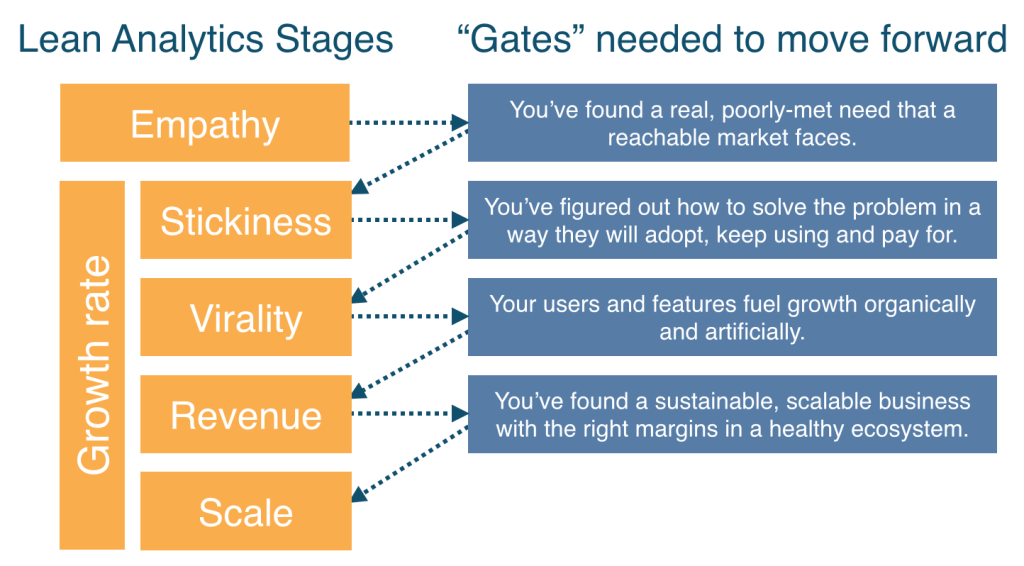
In the last couple weeks I’ve read a few great blog posts about product/market fit and the confusion that exists around what it really means. I’d say for many early stage startups, product/market fit is thought of as that point in time when you’ve finally built a product that people use and it’s time to scale. Is that really it?
Brad Feld wrote the first post I read, The Illusion of Product/Market Fit for SaaS Companies (lots of stuff applies to non-SaaS companies too). He shares some great myths around product/market fit that everyone should read. The key idea is that product/market fit isn’t a specific point in time for a startup, but an ongoing challenge.
Jevon MacDonald emphasizes this in his post, Products are Lines, not Dots, another must-read. Jevon writes:
In looking for perfection (product/market fit?) it’s easy to think it is something that *just happens* and then you are instantly successful. It’s never like that. It takes work and focus, and a vision for how the future is going to be different for your customers because of it.
Both Brad and Jevon are keying in on something that should be obvious: startups take a long time to be really, really successful and each step along the way isn’t success, but just a single step closer. If that’s the case, when do you get to product/market fit?
In Lean Analytics, Alistair and I defined 5 stages to a startup’s growth: Empathy, Stickiness, Virality, Revenue and Scale. Each stage has a “gate” that startups need to get through in order to move to the next stage. Here’s what it looks like:

After sharing this with many entrepreneurs, intrapreneurs, investors and others there are a few things I’ve come to realize. For starters, most startups fail at the Stickiness stage. This is the point where you’ve built an MVP (which in and of itself is a process not a point in time) and you’re out getting early adopters to use your product. Most founders will barrel right through this stage into Virality so that they can focus on acquiring more users/customers, without a good enough product (which is measured at this point mostly by usage). Unfortunately, they’re delusional and relying a bit too much on wishful thinking. Startups may get away with this for awhile but it usually crumbles when churn is too high and usage dries up even more. Without a solid foundation of usage you can’t build a great startup.
The second thing I’ve realized is that most entrepreneurs think of getting past the MVP process as achieving product/market fit. They’ve built a product that gets good usage from a decent base of users/customers and they’re ready to scale. By the way, this is exactly the point in time when many founders will claim they’ve gotten great traction with no marketing (which you should stop doing), even further proving (to themselves) that they’ve achieved product/market fit. Have they?
Yes and no.
Looking at the 5 Stages of Lean Analytics I think that product/market fit is achieved at each stage (excluding Empathy–there’s just too many unknowns still at that point).
When you have an MVP with good usage metrics from a solid base of users/customers you have a certain kind of product/market fit. But that doesn’t mean you’ll get through Virality and scale the business. Scaling a startup is a whole new set of problems, which means achieving product/market fit at scale becomes a new goal. Product/market fit at the Virality stage means you’ve found sustainable ways of acquiring good users (which includes user virality, but also marketing channels, sales and more). Once you’ve achieved that you move to Revenue.
At the Revenue stage you’re looking to make sure the economics of your business work. The metrics you care about change (e.g. MRR in SaaS has to reach a certain level as Brad Feld explains), and the financial model for your business has to make sense. The problems are different from the previous stage (although you can never stop working on the previous stages too in order to ensure stickiness and virality stay strong!) and therefore you’ve got a new product/market fit to achieve.
Startups evolve and change. You win a few battles and then lose a few, only to storm back and win some more. Share all the “up and to the right” graphs you’d like but there’s no such thing as a startup without struggle; it just doesn’t exist. By the same token it makes no sense to assume that once you’ve achieved some form of product/market fit that all your worries are behind you. It just doesn’t work that way.
Product/market fit isn’t a singular event in a startup’s existence. It’s something you have to achieve multiple times before you win. The Lean Analytics stages are a good measuring stick for figuring out where you are (and be honest with yourself, don’t jump ahead!) and what needs to be achieved next. It’ll also help you figure out what metrics you need to track and hopefully give you more confidence to move forward with a solid foundation.
Photo from Unsplash.
 Founding Partner at
Founding Partner at 